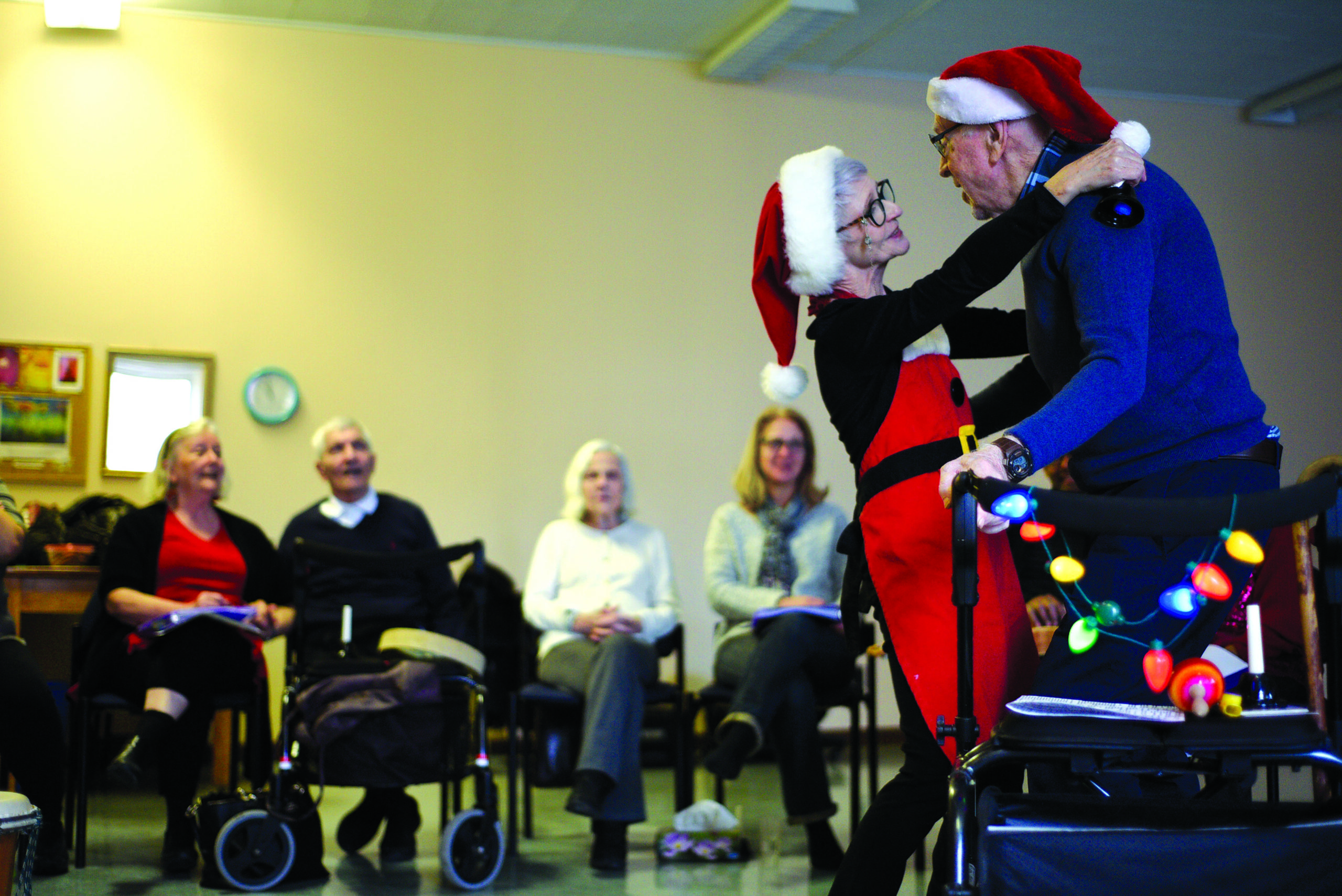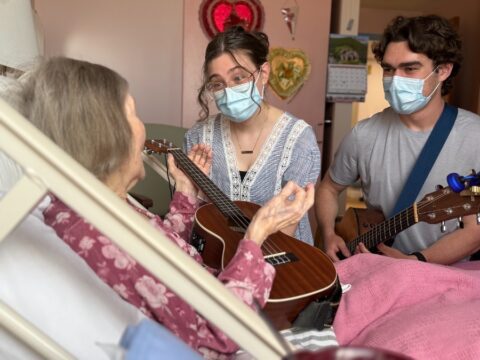In an inconspicuous room on the top floor of Ottawa’s Southminster United, a small group of people suffering from dementia and their carers are gathered. Chris White, one of the group’s leaders, amiably strums his guitar, calling out lyrics before he launches into the songs, inviting those who can’t follow to “la-la-la-la” their way through. Organized by the Dementia Society of Ottawa and Renfrew County, the Turquoise music program runs weekly, and I’ve been invited to sit in on a session.
In the beginning, the selections are oldies, like I’ve Been Working on the Railroad and Four Strong Winds. Later there will be action songs and new ones to learn. Doug, a participant, strums the mandolin. Sandy happily taps his djembe. White breaks out the kazoos he buys in lots of 50 — hailing them as an important instrument in his tool kit because everyone can play them. Moe Archambault, the group’s flamboyant co-ordinator, springs into an impromptu jig. Soon everyone is bopping to Twist and Shout. When the group starts slow dancing to Can’t Help Falling in Love, Lucie tenderly takes her husband Iain’s hand. His vacant expression lifts into the faintest smile.
The power of music mysteriously cuts through the mire of dementia and elevates the spirit through joy and connection. The therapeutic value of music is undeniable. The first two medical dissertations on the positive impact of music were published in the 1800s, and its use gained steam in North America after each of the world wars when community musicians travelled to military hospitals. In Canada, music therapists have been working independently since the 1950s.
In the mid-’60s, Lola Cuddy opened the Music Cognition Laboratory at Queen’s University in Kingston, Ont., one of the first of its kind in the world. At the time, she was trying to figure out how music affects cognition, the process of acquiring knowledge and understanding. In 2004, she published a paper on how music and memory affect each other. Already, the science is proving there’s a lot to sing about. Not only can music comfort and relieve agitation in people who have dementia, it can trigger memories. One day it might prove key to unlocking them.
In an interview, I tell Cuddy about Margaret, who lives in a long-term care residence where I lead a monthly chapel service. Margaret’s dementia has progressed so that she is often disoriented and agitated; she never remembers my name and occasionally forgets her own. Astonishingly, when she plays the keyboard during the services she strikes complex chords from memory. How can Margaret remember complicated church music yet forget she’s playing in the chapel?
“That’s the big question,” responds Cuddy. “Why is this happening?” Cuddy’s initial studies validated the anecdotal evidence that in mild and moderate stages of dementia musical memory is consistently spared. Now, she’s wondering if musical memory can be a gateway to accessing other memories. For example, could listening to the Wedding March help people with dementia remember their wedding day?
“We are finding that music stimulates what we call autobiographical memory, memories of one’s life and one’s self,” Cuddy says. “It stimulates memories that we don’t normally have, which may enable better communication with caregivers, family and staff.”

There are more questions than answers when it comes to the underlying mechanics, though. “Somehow, we are gaining access to the musical lexicon, but we aren’t using the normal routes,” Cuddy said in a lecture at Queen’s. “We might be accessing it through brain networks that process emotion, but then if that’s the only answer, why is face recognition so poor? There are emotional connections there, too.”
Daniel Levitin, professor emeritus at McGill University, is also trying to solve this mystery. Astor Piazzolla’s musical masterpiece Libertango and The Beatles’ song Girl sound worlds apart. But when Levitin, author of This Is Your Brain on Music, recorded the brain activity of the musician Sting while he listened to both, his mind immediately sized up their similarities — a clue that musicians’ brains tune into music differently. Yet music also strikes a rich chord for those of us who can’t carry a tune.
In Levitin’s upcoming book, Successful Aging, which is slated for release this year, he explains that the changes in the brain that serve to store a memory are called a memory trace. “Music has so many different components that when it forms a memory trace in the brain, there are a lot of different ways that the trace becomes activated. So what I mean is, music has pitch, melody, rhythm, harmony, timbre, maybe words and also feelings associated with the song, especially if you’ve heard it before. All those things make the memory trace robust,” says Levitin. “The beauty of having musical memories intact is that a large number of people who are otherwise cut off from other people or emotions or from their past are able to find new meaning in life and reconnect with themselves. That can be transformative.”
Some even argue that music is part of our very core, which might help to explain the longevity of its memory. In April 2018, I attended the Canadian Association of Spiritual Care conference in Huntsville, Ont. During one workshop, music therapist SarahRose Black argued that music is rooted in the essence of being alive. “Our beating heart is an internal metronome. There is melody in our voice as our speech goes up and down. There’s rhythm in our gait. Blood rushes through our veins. We don’t just listen to or create music, we are music,” she said emphatically.
Could that be why music memory is the last to go, because it’s not only stored across vast regions of the brain, but is also distributed across our whole being? Are we entirely wired for sound?
Luis Fornazzari, a behavioural neurologist with St. Michael’s Hospital in Toronto, seems to think so. When he took the stage to give the conference’s keynote address, he advocated for music education because “it shores up cognitive reserves.” He cited the case of French composer Maurice Ravel, who wrote Boléro in 1927, when some researchers say he started to experience symptoms of dementia. “The first instrument was a 40,000-year-old [bone] flute. Music is a fundamental part of our evolution; we probably sang before we spoke,” continued Fornazzari.
“We don’t just listen to or create music, we are music.”
Another speaker, Lee Bartel, professor emeritus of music at the University of Toronto, predicted that one day doctors will prescribe music. He talked animatedly about using low-frequency sound vibrations to treat Alzheimer’s, showing us an image of what appeared to be a high-end leather recliner.
He explained that the chair was designed to deliver sound at 40 hertz. The audience audibly gasped when Bartel claimed that after sitting in the chair for six half-hour sessions, the symptoms of participants in his study improved. He theorized that this particular gamma range can restore communication between different parts of the brain.
Nalini Sen, who oversees the Alzheimer Society of Canada’s research program, sounds a note of caution when I speak with her after Bartel’s conference presentation. “There were only 18 participants in Dr. Bartel’s study,” she says. “There is no other evidence that has demonstrated a permanent change or a reversal in the progression of the disease. More and larger-scale studies are needed before findings are conclusive.”
Basically, it’s too soon to tell if science is on the cusp of discovering that music can help form new neural pathways, roll back the clock on dementia or inoculate us from it in the first place. But there is consensus that music can elicit memory, improve quality of life and foster relational connections. This is good news for the more than half-million Canadians living with dementia and the legions of loved ones whose lives are affected. “We know we’ve got this ability to awaken something and connect through music,” says Turquoise music leader Chris White. “So the question now is: what are we going to do about it?”
Music is shared and social — much like the sacrament of communion. Given the critical role music already plays in churches, faith communities are a natural host for music’s restorative capacity. What would it look like if churches harnessed the power of music beyond belting out hymns on Sunday?
Bev Foster is executive director of Room 217 Foundation, a charity based in Port Perry, Ont., that is dedicated to using music to improve quality of care for dementia sufferers and others. Foster has led music in Baptist and Anglican churches. She says that the first step in providing pastoral care through music is to get to know the soundtrack of a person’s life.
“Find out their musical story,” suggests Foster. For instance, did they square dance? Do they have a favourite hymn? You can encourage singing, humming or playing along. “Don’t be afraid if the music triggers emotions. Obviously, if it’s causing distress, turn it off. But sometimes it’s calling up something that needs to be dealt with.”
Foster says that music can also help with people’s circadian rhythms, our 24-hour biological cycles, which can be off for those with dementia. Songs can put a rhythm to the day first thing in the morning and help with agitation during mealtime or “sundowning,” the period late in the day when symptoms of dementia can worsen. “Music care is really about presence because too often, people with dementia are alone,” she says.
Back at Turquoise, member Daphne accompanies White on piano as he calls out the chords to This Little Light of Mine. She plays flawlessly. Three years ago, Daphne learned she has Alzheimer’s. She was diagnosed when she started getting lost while out cycling and had to call her husband for directions. The disease has taken away other physical outlets, too. She no longer has the balance to play tennis.
In her younger years, Daphne passed her Grade 9 piano exam. Music went by the wayside in the busyness of mid-life. Since her diagnosis, though, she has rediscovered the joy of music. Now she plays and sings with her grown children, performs in concerts and is learning ukulele. “I think it’s creating new pathways for me,” she says. “I play piano all the time. The group has changed my life.”
During the session, White nonchalantly pitches an idea to Daphne and the other Turquoise members: “Thumbs up if you want to create and perform something at the Mayfair Theatre.” One fellow who lacks some verbal ability turns his thumb down, looks Chris squarely in the eye, smiles and slowly turns it up. They both howl with laughter.
“We put too much emphasis on language,” White tells me. “The brain might not have semantic ability anymore. So what? That brain might still be capable of learning new things. We’ve got other channels, like rhythm, laughter and just being in the group together to explore. . . . This is a creative adventure. We are creating with dementia. We’re not just babysitting or going gently into that good night. We are going with a big noise.”















Trisha Elliott is an amazingly perceptive and polished writer. I missed the initial appearance of this article and I am so glad this important article has resurfaced. As an ESG for my partner in LTC, when I am not feeding her I am singing with her. Lillian no longer speaks independently but she remembers all the words when we sing together.